Meet Komala, who’s bringing beauty back into business
By Shivani Kochhar
Running her own beauty salon had been a dream of Komala’s since childhood, but lacking education and in her mid-30s, she was a housewife living on the brink of poverty instead.
The ugly truth
In India, one in five people are considered ‘poor’, living on less than $1.90 a day. This is partly due to the nature of employment: only 17 percent of jobs are salaried and one-third are irregular. Women looking for work have even more hurdles to overcome as there is large gender gap in the workforce. Just 27 percent of women participate in the labour force at all, compared to 79.1 percent of men. Clearly, the odds were against Komala – so she decided to take matters into her own hands.
Transformation
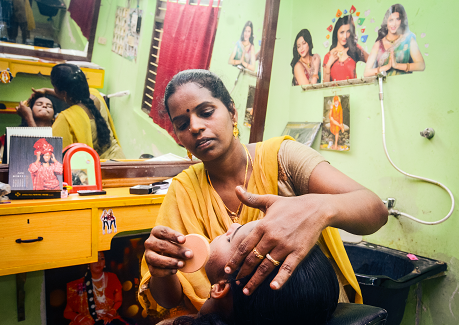
Things changed for Komala when Hand in Hand arrived in her panchayat. Inspired by her Self-Help Group’s promise of beautician training, not to mention a loan to get her started, she soon finished her training and opened up shop. With four beauty salons nearby already, she established a competitive advantage based on comparatively low prices and superior customer service. She is especially busy during wedding season when everyone needs to be pampered to perfection.
“Some of my neighbours have been motivated to start up a business of their own,” she says.
A touch of sparkle
Even with business humming, Komala found she had downtime during the day. That’s when she established a side-business embellishing saris with sequins and embroidery that now accounts for 30 percent of her income. But she wasn’t done there. Sensing opportunity, Komala qualified to become a beauty trainer herself, and today teaches up to 20 students a month. She earns INR 1,000 (US $15) per student and gets the satisfaction of helping other women start their careers. “Even though I am training members of my community, they see me as a professional,” says Komala.
Pondicherry, India
Looking forward
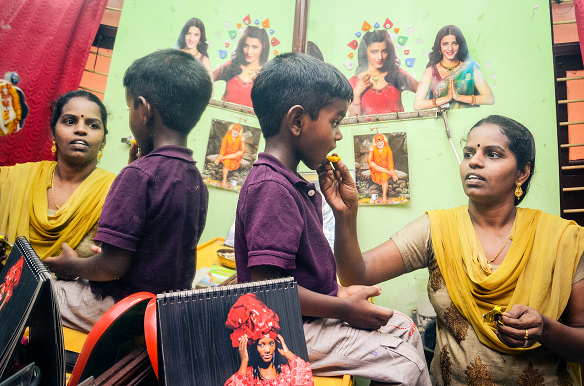
Together, her three streams of income bring in an average of INR 51,600 (US $770) a month. That’s enough to pay for life-changing appliances including a refrigerator and air conditioner. She can also afford some luxuries such as a TV. Next up: Komala is saving to buy a permanent home for her family and, when they grow up, pay for her two children’s university. “I hope that my son will become a doctor,” she says.
And her plans for her business? “I want to brand my salon with my own name, to make it stand out from others in the neighbourhood.” Sounds like a winning idea to us.
Komala’s results
![]()
Earns INR 51,600 (US $770) a month
![]()
Able to give her children a university education
![]()
Helps the community by teaching her skills to budding beauticians
Meet Jagadeeswari, the spice-seller with SME status
By Shivani Kochhar
Jagadeeswari could give any entrepreneur a run for their money. Five years ago, she was distributing her spices as free samples to neighbours and her business was making a loss. Fast-forward to today and she has won a state prize for ‘First-Generation SME Entrepreneur of the Year’. Her distribution network spans 200 shops across her home state of Tamil Nadu, and she sends her spices as far away as Malaysia. It’s a homegrown business gone global, and an unlikely success story in a state where 22.5 percent of people live below the poverty line, earning less than US $1.90 a day. Jagadeeswari’s successes are an exception to the rule rather than the norm – something that Hand in Hand aims to change.
Pondicherry, India
The perfect blend
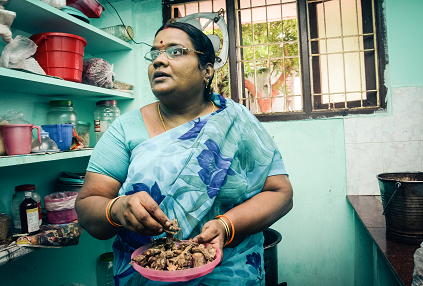
Jagadeeswari flourished at her Hand in Hand Self-Help Group. The energetic 46-year-old is a natural leader, and her fellow group members quickly selected her to be in charge. Jagadeeswari started selling her spices at food fairs and managed to grow her client base district-by-district until she had established a state-wide network. Recognising her potential, Jagadeeswari’s Hand in Hand trainer provided her with special training in bookkeeping and packaging.
“Joining the Self-Help Group changed my life totally,” says Jagadeeswari, who now produces a range of around 40 all-natural spices and food products. She is the only producer in town with such a wide range of condiments.
Sugar and spice
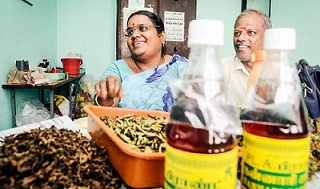 Jagadeeswari wanted to increase her product range and hit a winner: Sarpath. A refreshing all-natural sweet soda, it’s perfect for washing down all those spices. Now she earns 35,000 INR (US$ 525) every month in pure profit. She also employs five staff including her husband, who helps with marketing and sales. He’s pleased for Jagadeeswari: “I’m very happy about my wife’s success.”
Jagadeeswari wanted to increase her product range and hit a winner: Sarpath. A refreshing all-natural sweet soda, it’s perfect for washing down all those spices. Now she earns 35,000 INR (US$ 525) every month in pure profit. She also employs five staff including her husband, who helps with marketing and sales. He’s pleased for Jagadeeswari: “I’m very happy about my wife’s success.”
Woman power
As business is booming, Jagadeeswari has bought a separate building for her work and invested in a packing machine. Besides her husband, all her employees were formerly housewives and members of her Self-Help Group. Most importantly, the income generated from her spice business finances her son’s architectural training. Investing in her son’s education has already paid off – he helps her to do her marketing and created a website for the business. Jagadeeswari‘s children now call her “mother role model”. She’s their inspiration.
As for her Entrepreneur of the Year award, Jagadeeswari says she’s happy for the publicity – as long as it attracts new clients. Clearly, she never stops being the businesswoman.
Jagadeeswari’s results
Earns 35,000 INR (US$ 525) net profit per month
Sends her son to architectural school
Achieved SME level status
Meet Savitah from Kanchipuram, who’s gone from paper dreams to paper plates
By Shivani Kochhar
Savitah’s paper-plate business was making no profit at all. The 26-year-old newlywed had little experience of business. But she did have a drive to succeed.
A woman on a mission
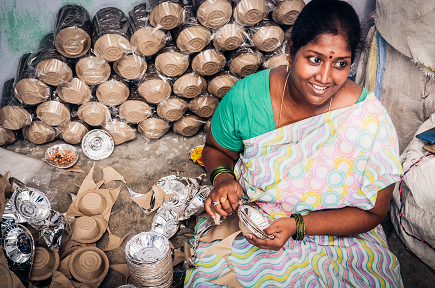
Savitah was inspired by her friends in Bangalore to go into business. Most of all, she admired the bravery of these female entrepreneurs for breaking the status quo: just 27 percent of women participate in the labour force at all, compared to 79 percent of men. Savitah initially attended a Self-Help Group to finance a paper-plate-making machine. One thing led to another: she completed bookkeeping training and realised that 85 percent of her total costs went on raw materials, preventing her from making a profit.
Savitah put every effort into sourcing cheap materials, knowing they could make or break her business, searching as far afield as Delhi (2,200 km away). In the end, she managed to find a supplier much closer to home in Chennai.
The secret to success
Today Savitah consistently undercuts her competitors – and watches her sales soar. With her savvy sourcing, she maintains a healthy 27 percent profit margin. This is boosted by the sale of off-cuts to paper merchants who use them to make recycled paper. It’s business-smart and environmentally sustainable. Her monthly net income, once zero, is now 21,500 rupees (US $350).
Kanchipuram, Tamil Nadu
Independent woman
Most of Savitah’s income has been reinvested in the business, but she keeps a little for herself so she can feel more independent in her daily life. “When I leave the house now, I don’t need to ask my husband for money,” she says.
Her husband questioned the need to buy a second machine but Savitah’s reasoning was as simple as it was compelling: “Anyone who buys a paper bowl will also need a paper plate, so let’s buy that machine, too.” Although she’s an entrepreneur at heart, Savitah says, “Before joining the Hand in Hand group, I would not have been confident to make a decision like that on my own.”
Team leader
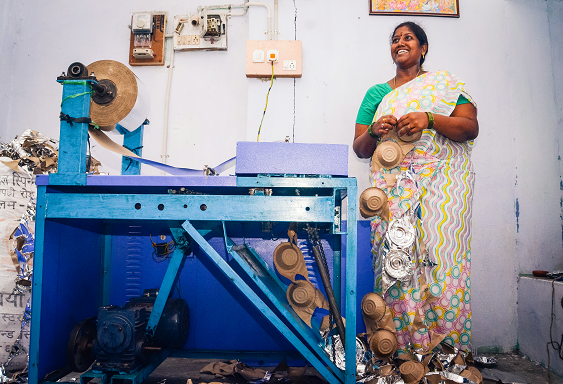
Savitah exudes a quiet confidence and determination, and since she first joined the group she’s persuaded five new members to join. Her peers chose her as their group leader, a role that entails managing meetings, teaching basic business skills and encouraging members to start their own businesses. A fast learner herself, she observes: “Sometimes it takes members so long to get up to speed with the concept; you have to be patient until they understand the approach.”
A working mum
Now 31, Savitah is expecting her first child but is confident that she will continue on her path as an entrepreneur and group leader. “I enjoy being independent and helping others to be independent, too,” she says.
Savitah’s results
Earns 21,500INR (US$ 350) net income per month
Voted to be the leader of her Self-Help group
Has financial independence
Meet Zacharie, the salesman from Rwinkwavu
Ambition, the gift of gab, a relentless work ethic – Zacharie Itegekaharmde has all the traits of a born salesman. What he didn’t have was capital.
Then he found Hand in Hand.
Limited progress
Until a few years ago, Zacharie lived with his brother and elderly mother as one of the almost 80 percent of Rwandans who farm for a living, many at the subsistence level. Stuck on a cramped plot in the Eastern Province village of Rwinkwavu, the family struggled to eat three meals a day. “The farming was just for survival,” he says. “We could not get enough food to eat. We used to make and sell banana beer so that we could afford to buy clothes.”
Rwanda has come a long way since the 1994 genocide claimed some 800,000 lives. The country made “especially impressive progress” on a number of UN Millennium Development Goals, particularly in the areas of extreme poverty reduction and primary school education. But there remains a hugely long way to go. On the UN Human Development Index, for example, Rwanda ranks a sobering 158 of 189.
Sell phones
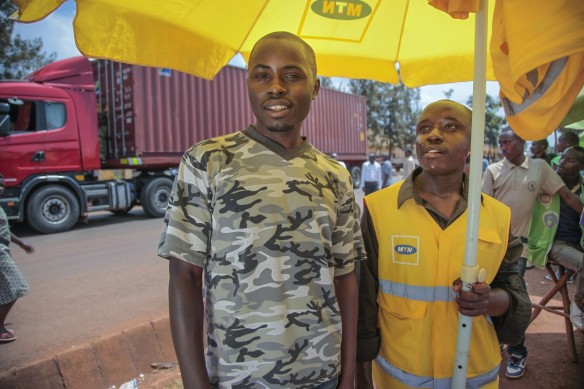 Life changed the day a sceptical Zacharie was persuaded by friends to join a Village Savings and Loan Group established by Hand in Hand partner organization CARE. To his surprise, admits the 25-year-old, the training was interesting. Better still, it was useful. “You learn that if you get a loan it is not to solve your problems but to make money,” he says. That’s exactly what he’s doing.
Life changed the day a sceptical Zacharie was persuaded by friends to join a Village Savings and Loan Group established by Hand in Hand partner organization CARE. To his surprise, admits the 25-year-old, the training was interesting. Better still, it was useful. “You learn that if you get a loan it is not to solve your problems but to make money,” he says. That’s exactly what he’s doing.
The Rwandan telecoms market is exploding. Between 2005 and 2010, the number of families with at least one cellphone grew 39 percent, climbing past 45 percent from only 6.2. By 2013, cellphone penetration countrywide was more than 61 percent.
Zacharie didn’t need business training to spot the opportunity. In fact, he’d been selling cellphone products on the side for years, making all but enough to invest and expand. Getting a loan from his savings group was easy enough. Pitching South African telecom company MTN for an exclusive airtime card distribution deal was harder. But armed with the skills he’d learned in his group from a Hand in Hand trainer, Zacharie pulled it off. Today his ‘patch’ spans a 125-mile radius, an area so big he’s had to hire help. Even better, his income has skyrocketed to 110,000 Rwandan francs (US $160) a month – almost three times the monthly national average of 37,000 RWF (US $55).
The resulting lifestyle change has been immense. Not only has Zacharie built a brick home, he’s furnished it – just in time for his upcoming wedding.
Zacharie’s results
![]()
Increased monthly income to 110,000 Rwandan francs (US $160)
Hand in Hand Eastern Africa and CARE Rwanda are co-operating to empower some 100,000 Rwandans, mostly women, to work their way out of poverty by running their own sustainable businesses. The three-year, US $3.2 million partnership is grounded in our shared belief in the power of entrepreneurship to fight poverty.
Meet Rahabu, the shop owner from Nyarubuye
Five years ago, Rahabu Mukampenda couldn’t get credit. Today, she provides it. And to think it’s all down to a few simple skills she learned at a Village Savings and Loans Group.
Tomato catch-up
Stop by Rahabu’s bustling shop in Burembo village, Rwanda and there’s a few things you’ll quickly notice. First, the variety of stock. The 44-year-old started out in 2010 with a crop of tomatoes she’d grown herself, having noted their popularity in nearby markets, but today her bestsellers range from cooking oil to body lotion, each chosen to satisfy customer demand.
Second is the abundance of customers. There are two nearby shops in Rahuba’s corner of Nyarubuye district, Eastern Province, but neither is as conveniently located. As a result she nets 20,000 Rwandan Francs (US $30) a month.
A long way travelled, a longer way to go
The human cost of Rwanda’s genocide is well-known, if inconceivable: over the course of 100 days in 1994 an estimated 800,000 were killed, literally decimating the country’s population. The economic cost is underreported, if staggering: in ’94 alone, growth dropped by 50 percent while inflation rose to 64 percent. The plunge helps explain how, despite high growth rates and decreasing poverty, the country remains one where almost 80 percent of the population is involved in farming, most at the subsistence level.
Rahabu was one of them. Back in 2009, before she joined a Village Savings and Loans Group organised by Hand in Hand Eastern Africa field partner CARE Rwanda, the mother of seven daughters aged 6 to 23 tended a small patch of land for 12 hours a day, growing just enough for the family to eat once daily. Soap, new clothes and secondary school fees were out of the question.
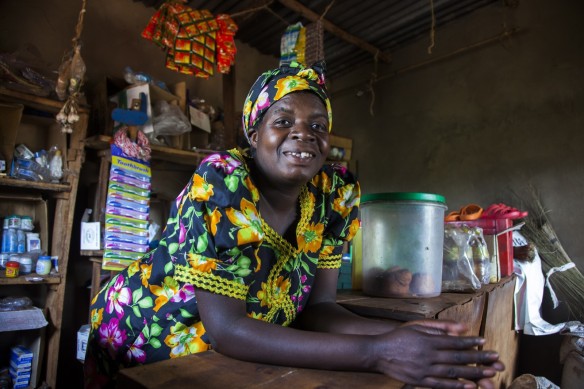 When she first joined the group, Rahabu worked for others to earn the 400 RWF (US $0.60) in required weekly savings. Discipline came easy. “You sometimes go to market to buy beans but when you are there you see something else that you would like and so you spend more than you meant to,” she said. “Because of the training I learned to buy what I need and save the rest.”
When she first joined the group, Rahabu worked for others to earn the 400 RWF (US $0.60) in required weekly savings. Discipline came easy. “You sometimes go to market to buy beans but when you are there you see something else that you would like and so you spend more than you meant to,” she said. “Because of the training I learned to buy what I need and save the rest.”
Having learned how to save, Rahabu soon graduated to learning basic financial and marketing skills. Now she’ll hold on to stock until prices rise, or extend credit to customers who can’t afford the essentials.
The dish
Back at home, things have changed immeasurably. Rahabu didn’t just buy dishes – she bought cupboards to store them. She even bought a modern stove. Even better, she says, her four youngest children will attend secondary school – a first in the family. With success like that, Rahubu’s husband Mutabagisha has been happy to take over the family farm. And Rahabu? She’s busy puzzling over her next move: how to expand her business.
Rahabu’s results
In 2013, Hand in Hand Eastern Africa and CARE Rwanda co-operated to empower some 100,000 Rwandans, mostly women, to work their way out of poverty by running their own sustainable businesses. The three-year, US $3.2 million partnership was grounded in our shared belief in the power of entrepreneurship to fight poverty.
Meet Parvathi, the glove manufacturer from Tamil Nadu
With three children, one employee and a fast-growing business, Parvathi is the archetypal Hand in Hand entrepreneur. There’s just one difference: more than anyone we’ve met, the 52-year-old proves that it pays to invest in your children’s education. Literally.
Parvathi joined Hand in Hand and quickly set about establishing a knitting and embroidering enterprise. It wasn’t wildly successful, she says, but it earned enough to help put her children through university. Business was humming along fine when, a few years back, her son got his first job as an engineer – and along with it his first pair of protective gloves. And his second. And his third. Shocked at the quantity of gloves his workplace devoured, Parvathi’s son suggested she start a new line of business: manufacturing protective gloves. The switch wouldn’t be easy. For one, she would need to import an INR 500,000 (US $8,300) machine from Japan. But as a Hand in Hand Self-Help Group member for eight years, Parvathi knew where to turn.
Rural unemployment
Women entrepreneurs face huge barriers in India. According to the International Labour Organization the country ranks 120 out of 131 in women’s labour force participation. Rurally, barely one in three women work – 19.5 million fewer than just five years ago. The numbers are borne out in Tamil Nadu, the southern India state Parvathi calls home. More than 20 percent of residents here live below the poverty line, most of them rural. Access to credit can make all the difference.
Parvathi’s neighbourhood
Breaking the thatched ceiling
Parvathi borrowed the money from her group, imported the machine from Japan and got to work. Although her expenses had grown – materials had to be in ordered in bulk from Coimbatore almost 500 km away – so too did her profits. Parvathi now owns two knitting machines yielding INR 176,000 (US $2,900) a month, INR 54,800 (US $912) in pure profit. Loans to buy two more are pending.
“Ten years ago, I was even scared to go out of the house and speak to anyone,” she says. “Now I have even learned how to speak with bankers.”
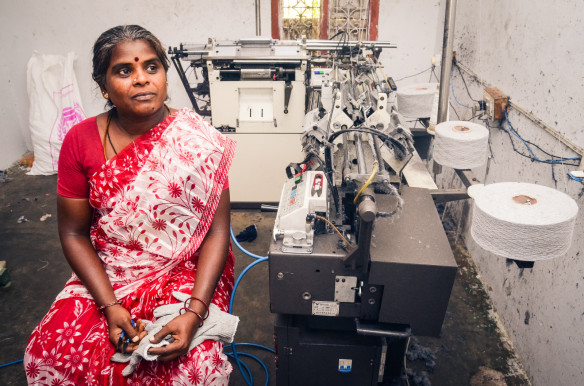 Parvathi’s self-confidence isn’t the only thing to have improved. Where once they shared a one-room thatched-roof hut, Parvathi’s family now live in a brand new concrete home. For the first time, the future looks bright.
Parvathi’s self-confidence isn’t the only thing to have improved. Where once they shared a one-room thatched-roof hut, Parvathi’s family now live in a brand new concrete home. For the first time, the future looks bright.
“I want to safeguard the future of my children with this business,” says Parvathi. And indeed she has. Only a year after starting his career as an engineer, Parvathi’s son is coming to work for the family business. The opportunities, he’d told her, are better.
“I worked hard and they rested,” she says. “Now it is my turn to rest and theirs to work”.
Parvathi’s results
Meet Florida, the young mother saving to put her children through school
So often, beneficiaries in the developing world are reduced to cold numbers. But ask Florida Mukarugema what’s been the biggest change since she opened her shop and her answer won’t fit on any graph. “I am feeling happy. I am no longer crying.”
Florida joined a Village Savings and Loan group organised by Hand in Hand field partner CARE in 2009, driven, like so many others, by sheer desperation. “We used to eat just once a day, in the evening. We didn’t have our own home but stayed with others. I couldn’t even afford a bunch of bananas,” she says.
How things have changed. Today, bananas are Florida’s bestselling item, the staple around which the young mother built her growing business, which also sells rice, maize flour and more. Recently, with help from a Hand in Hand business trainer, she borrowed 108,000 Rwandan francs (US $158) to build a water facility and sell clean water. Tally her earnings from both and Florida’s annual income is 1,200,000 RWF (US $1,760), almost ten times what she made previously and three times the gross national income per capita.
A country rebuilds
Life in Rwanda has improved beyond description in the 20 years since genocide convulsed the country, claiming some 800,000 lives in just 100 days. The economy is growing at upwards of 8 percent a year. Rwanda was- “top-performing” at the Millennium Development Goals, according to the UN. Social progress, evinced by the world’s greatest proportion of women MPs – 64 percent – has been undeniable. And yet there remains a hugely long way to go.
Florida’s neighborhood
Rural Rwanda, home to Florida’s Eastern Province village of Kinamba, experiences three times more poverty than urban Rwanda. Countrywide, more than 80 percent of Rwandans are engaged in agriculture, many at the subsistence level. And almost a third of Rwandans are considered undernourished by the International Food Policy Research Institute.
Savings and loans
Florida was one of them. Then she borrowed 15,000 RWF (US $22) from her Village Savings and Loan group and bought three bundles of bananas, which quickly sold for 28,000 RWF (US $41). Buoyed by a series of ever-bigger successes, Florida went on to borrow 200,000 RWF (US $294) from her group to open a shop.
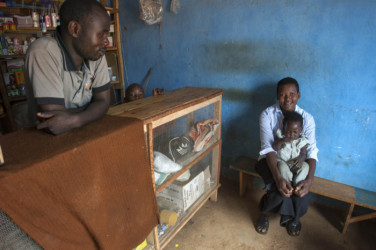
“Before I joined the group I was not even able to buy salt,” she says. “I did not know how to use the bank and I did not understand how to buy and sell and make a profit.”
Today, Florida, her husband and the couple’s four children – two of whom are adopted – live in a furnished three-room home with clean water. “I will make sure they go to university and then live in a nice place,” she says.
Florida’s results
Annual income of 1,200,000 RWF (US $1,760) – 10 times her previous income
200,000 RWF (US $290) in savings
Saving to pay for children’s university fees
Hand in Hand Eastern Africa and CARE Rwanda are co-operating to empower some 100,000 Rwandans, mostly women, to work their way out of poverty by running their own sustainable businesses. The three-year, US $3.2 million partnership is grounded in our shared belief in the power of entrepreneurship to fight poverty.
Meet greenhouse farmer Alice Maina
At an age where most people would think of retiring, Alice Maina has started a flourishing small agri-business which will set her and her husband up safely for old age. Thanks to Hand in Hand’s support she now earns KES 20,000 (US $231) a month selling tomatoes and ‘piri piri’ chilli peppers, grown in a greenhouse which she built on her land.
Making ends meet
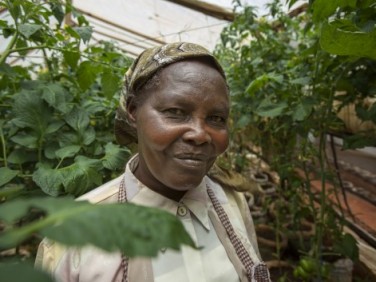 Alice lives in a hamlet near Gatundu, in Kiambu county, which despite being only 16 kilometres north of Nairobi is a lush rural area dominated by large commercial farms growing coffee, tea and pineapples. Automation means these farms do not offer much local employment. Instead, most people here are subsistence farmers who just about manage to live off small family-owned plots, which are shrinking in size as the population continues to grow. Alice was a public school teacher – a poorly paid profession in Kenya – when arthritis forced her to retire early. She and her husband were growing vegetables for their own consumption.
Alice lives in a hamlet near Gatundu, in Kiambu county, which despite being only 16 kilometres north of Nairobi is a lush rural area dominated by large commercial farms growing coffee, tea and pineapples. Automation means these farms do not offer much local employment. Instead, most people here are subsistence farmers who just about manage to live off small family-owned plots, which are shrinking in size as the population continues to grow. Alice was a public school teacher – a poorly paid profession in Kenya – when arthritis forced her to retire early. She and her husband were growing vegetables for their own consumption.
Gatundu, Kenya
A bold investment
When Hand in Hand started training her local members’ group, Alice recognized that in order to survive she needed to make her only asset work harder. Alice borrowed money from her local group’s savings fund to buy piri piri chilli seeds, knowing the small peppers fetch a good price on the local market. Her first crop of chillies produced an income of KES 48,000 (US $550) in two months. “I made a good profit because I cut out the middle man and went to the market myself to sell the chillies,” says Alice.
Alice then used KES 15,000 (US $170) of the proceeds and a loan of KES 100,000 (US $1,000) from Kenya’s leading microfinance institution, to whom her Hand in Hand trainer introduced her, to build a small greenhouse.
Thriving on tomatoes
Thanks to the greenhouse, she managed to grow a sizeable crop of beautiful tomatoes. The former teacher has a keen understanding of competition and attributes her commercial success to three things: “Better quality – my greenhouse tomatoes taste better than the normal ones. Good presentation – I always wash them and put them in nice boxes. And last, I’m a good saleswoman – I make sure to talk to all my customers. That’s why I sell more than others.”
“I cut out the middle man and went to the market myself”
Alice feels that the Hand in Hand business training has protected her economic future. “Ten shillings used to buy me flour, sugar, tomatoes and even milk, but now it hardly buys me anything. Life has changed and so I need to change.”
Not content to stand still, she is looking forward to a bigger second crop of tomatoes now. Her Hand in Hand trainer introduced her to a farming expert from the Kenyan Ministry of Agriculture to show her better horticulture techniques.
Sharing success
She is also employing Patrick Kahuni (pictured right), one of her neighbours, to water, fertilise and weed the plants while she goes to the market. Patrick,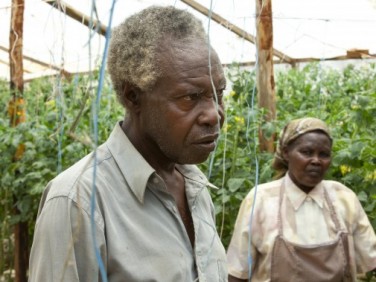 a father of ten, also farms his own ancestral land but, like Alice, could not make it pay. As a result, Patrick could not afford Kenya’s secondary school fees and four of his chyildren had to drop out of school. Working for Alice has meant that Patrick has managed to put one of his children through secondary education.
a father of ten, also farms his own ancestral land but, like Alice, could not make it pay. As a result, Patrick could not afford Kenya’s secondary school fees and four of his chyildren had to drop out of school. Working for Alice has meant that Patrick has managed to put one of his children through secondary education.
Alice herself is funding her granddaughter’s secondary schooling and is saving up for her own old age.
“I am over 60 now so, God willing, one day I will not have to work anymore. I want to save today, for tomorrow. I want to work hard then retire.”
Alice’s results
Monthly income of KES 20,000 (US $231)
Funds granddaughter’s schooling
Employs neighbour with a family of 10
Padmavathi, sculptor
Padmavathi is a 26-year-old mother of two. For her and her family life has been a long struggle. Although she was born into a sculpting family, and learnt the skill as a child, Padmavathi soon discovered it was not considered a profession for women. Her education was short-lived and then she was married off to a sculptor. Unfortunately, orders were hard to come by and their income was meagre.
Then Padmavathi heard about Hand in Hand and joined a Self-Help Group, where she was taught how to save, the basics of accounting and how to expand a small business. She took a loan not only to expand her husband’s business by buying raw material and better tools but also to take up sculpting herself.
She has already paid back that first loan and says “Repayment is not a problem. I made sure the loan is used only for business.”
The village still marvels at her transformation into a self-assured professional sculptor who earns anywhere between INR 7,000 and INR 10,000 a month (US $150 – 200).
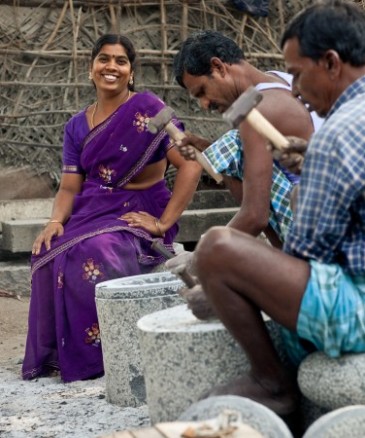
Meet Mushtary, Rejin’s first female shop owner
Mushtary is breaking new ground as a shopkeeper and entrepreneur in the rural village of Rejin, Afghanistan.
A shop to stave off hunger
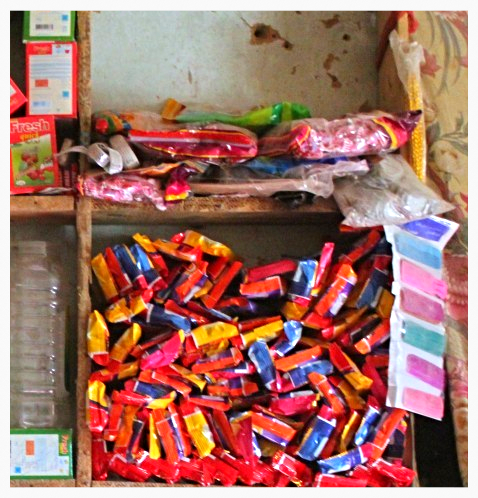
Mushtary’s shop |Products on shelf | Balk province, Afghanistan
The regular profits from her business enable her to supplement the small and variable income the family gets from farming. “Farming in our area is risky because we rely on the rain and if the weather is not right then we lose everything. The shop means that even in the bad times we can buy food to eat.”
Initially Mushtary and her neighbours joined the Self-Help Group set up by Hand in Hand Afghanistan in their village out of curiosity but quickly realised that there was so much they could learn. Together the group of 20 members began saving a little money each week to build up a group savings fund and learnt basic business skills such as bookkeeping.
Historically the people in Rejin village are farmers, so the majority of the members in the group decided to use their new skills to branch out into animal husbandry. Mushtary had other ideas. She and her husband had struggled for many years to support their family on the income from farming but they could not rely on this income. Everything depended on the weather. Mushtary saw an opportunity to stabilise the family income.
Rejin’s first retailer
Rejin is an isolated rural village. Women have to travel long distances to buy everyday household items and Mushtary realised that if there was a shop in the village, local people would chose to buy what they needed here. So, Mushtary borrowed from the group fund in order to buy her initial stock of clothes. These sold so well that Mushtary made a profit of AFN 5,000 (US $96). From this small beginning she went on to borrow a further AFN 10,000 (US $192) and has now opened a shop selling tea, sugar, biscuits, chewing gum, shampoo, washing up liquid, soap and many more necessary items.
“Even in the bad times we can buy food to eat”
